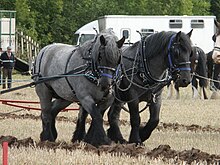Dutch Draft
 | |
| Conservation status | FAO (2007): not at risk[1]: 83 |
|---|---|
| Country of origin | The Netherlands |
| Distribution | central and southern Netherlands |
| Use | draught work |
| Traits | |
| Weight | |
| Height | |
The Dutch Draft, Template:Lang-nl, is a Dutch breed of heavy draft horse. It is of cold-blood type, massively built and calm in temperament; it has good stamina. It was bred in the early twentieth century in the province of Zeeland, and may for that reason be known as the Zeeland Horse or Template:Lang-nl.[3]: 462 It derives from cross-breeding of local Zeeland mares with the Belgian Ardennes and Brabant breeds, to which it is very similar.
History
The Dutch Draft was created in the years after the First World War by cross-breeding the heavy draft mares of the province of Zeeland with Ardennes and Brabant stock from neighbouring Belgium.[4]: 273 [3]: 462 Until after the Second World War, it was the most important Dutch horse breed, but with the mechanisation of agriculture, it declined rapidly.[5] In 2009 the breed population was reported to be 1424.[2] There are two breeders' associations for the horse: the Koninklijke Vereniging Het Nederlandse Trekpaard en de Haflinger ("royal association for the Nederlands Trekpaard and the Haflinger") and the Stichting het Werkend Trekpaard Zeeland ("foundation for the working draught horse of Zeeland");[5] the former was founded in 1914, and received a royal charter in 1948.[6]
Characteristics
The Dutch Draft is a massive cold-blooded horse, with free movements, a calm temperament and good stamina.[4]: 273 The legs are heavily feathered.[5]
References
- ^ Barbara Rischkowsky, D. Pilling (eds.) (2007). List of breeds documented in the Global Databank for Animal Genetic Resources, annex to The State of the World's Animal Genetic Resources for Food and Agriculture. Rome: Food and Agriculture Organization of the United Nations. ISBN 9789251057629. Accessed June 2017.
- ^ a b c d e Het Nederlandse Trekpaard/Netherlands. Domestic Animal Diversity Information System of the Food and Agriculture Organization of the United Nations. Accessed June 2017.
- ^ a b Valerie Porter, Lawrence Alderson, Stephen J.G. Hall, D. Phillip Sponenberg (2016). Mason's World Encyclopedia of Livestock Breeds and Breeding (sixth edition). Wallingford: CABI. ISBN 9781780647944.
- ^ a b Elwyn Hartley Edwards (1994). The Encyclopedia of the Horse. London; New York; Stuttgart; Moscow: Dorling Kindersley. ISBN 0751301159.
- ^ a b c Nederlands Trekpaard (in Dutch). Stichting Zeldzame Huisdierrassen. Accessed June 2017.
- ^ Oprichting vereniging (in Dutch). Koninklijke Vereniging Het Nederlandse Trekpaard en de Haflinger. Accessed June 2017.
Further reading
- Tamsin Pickeral (2001). The Encyclopedia of Horses and Ponies. Parragon Plus, 2001. ISBN 0752541587.
- Susan McBane (1997). The Illustrated Encyclopaedia of Horse Breeds. Wellfleet Press.
